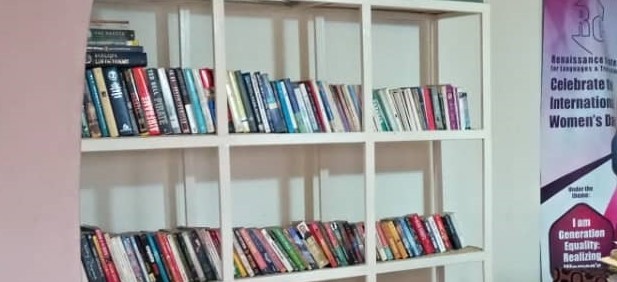Yedjwok Agwet, is a cultural activist, translator and founder, and programs director at Renaissance Cultural Centre which also runs a public library in South Sudan’s capital, Juba.
Radio Tamazuj caught up with and sounded him out about the reading culture, publishing inter alia in South Sudan.
Following are edited excerpts from the conversation:
Q: What is the reading culture like in South Sudan as compared to the rest of the world?
A: Internationally, the culture of reading is widespread, especially in the developed world. It is through reading that you enhance the capacity of people in every nation. It is through reading that it will be easy for any development to achieve the transformation from backwards to a sort of modern life.
In South Sudan, reading is quite a problem because there are still some challenges. The culture of reading is not yet perfect and has not taken off quite yet.
Q: Are people you interact with understanding the books they read? And if so, is there any impact you are seeing in the community?
A: Talking of my experience, most of the people who come here are university students so I don’t think they face any difficulties in understanding these books. But of course, you cannot just measure any difference or improvement in one or two years. I think this (developing a reading culture) takes time. But what I noticed is that sometimes when we do booklore and discussions, there is a big improvement among some readers. They expand their knowledge and approach things differently.
Q: What hinders South Sudanese from reading?
A: We mostly have two reasons when it comes to this. They say there is no electricity. Now there is electricity. Then they say there are no libraries and no bookshops. It is quite difficult to access books. The idea behind establishing this place was to provide easy access to books for those who want to read. We are now working to expand this place so that instead of just coming to borrow books people can come and read from here.
So I think the challenges are many and some are economic. To read, you must be satisfied in the first place, you can provide food, a good shelter and you are living comfortably to some extent, then you can read. Considering the general economic situation, it is quite difficult for most people to read as most of their time is consumed by trying just to satisfy their basic needs. They don’t even find reading useful in such situations, asking why I should waste my time reading when I should be working to meet a certain commitment for example.
Q: So the reading culture is low?
A: Yes! It is low. It is quite low. Even among the few readers who are members here, you will notice that most of them come from a fairly good economic background.
Q: What are the challenges facing authors and or publishers in South Sudan?
A: In South Sudan, we have two recognized publishing houses and one is called Rafiki. The first problem is that these two publication houses are based outside South Sudan so it is quite difficult for writers here to access them. The second thing is that South Sudanese have an oral culture of recording events and history and do not write. We have a lot of intellectuals here but the problem is that they don’t write.
Our culture is more of oral people who don't write at all. It is quite difficult to get access to South Sudanese publication houses that are mainly based outside. One is based in Australia, African Notebook, and two are based in Cairo Al Rafiki and Yunus house. So most of the authors here like Keri Wani printed their books at Universal Printers Company and other local printers here in Juba and their printing is not quite to the standard. You will realize that there are a lot of writers in South Sudan but still, the number of the books that have been published are small when you compare them to writers here because most of them are facing challenges on how to publish.
Q: Do we have copyright laws in South Sudan?
A: I am not familiar with any laws concerning publications in South Sudan and even there is no law up to now to reserve the intellectual property of writers. Plagiarism is very common among writers in South Sudan because of the lack of these laws.
Q: Among the many books in this library, which book is most liked by South Sudanese?
A: Most of the people who come here prefer books written by South Sudanese, mainly books on the history of the liberation war. Many people will come here looking for books by Dr. Francis Deng, Dr. John Gai, Arop Madut, a well-known journalist, and books by Jacob Jiel Akol. These are the common books here. The shared thing among these books is that most of them are about the history of South Sudan from 1955 during the first war up to 2005.
Q: What are the common ages of people who are reading these books nowadays?
A: Here commonly mid-20s to 40-year-olds and then most of them are students from the University of Juba.
Q: Any other thing you want to tell readers regarding this institution?
A: In the whole of Juba we have two libraries, there is this one and another one in Gudele. The problem we are facing is that we don’t have a place where people can read and leave books behind. I don’t take the identity cards of book borrowers, I just ask them to write down their names and telephone numbers and many don’t return the books at all. I hope that soon many libraries will come up around Juba to make it easy for those who need to access books.




